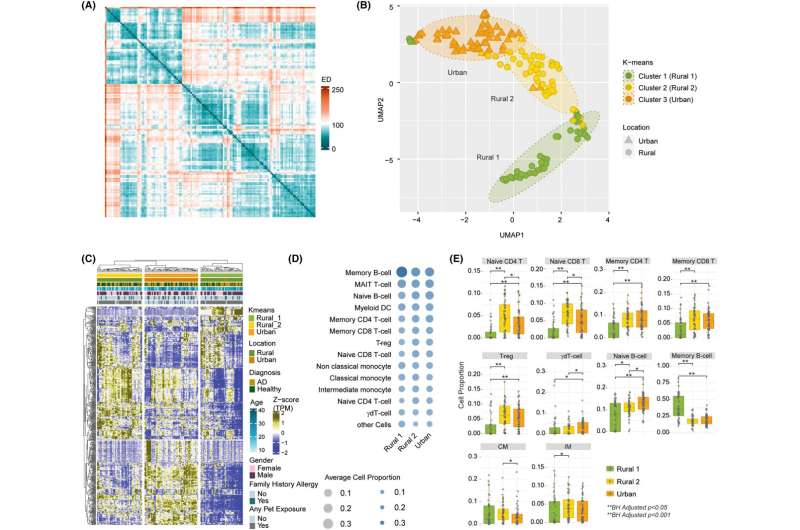This article has been reviewed according to Science X's editorial process and policies. Editors have highlighted the following attributes while ensuring the content's credibility:
fact-checked
peer-reviewed publication
trusted source
proofread
Rural environment supports children's immune systems

Children raised in rural environments who spend a lot of time outdoors with some exposure to animals grow to have better regulated immune systems than children living in urban environments, a new study has found.
Research led by APC Microbiome Ireland (APC), a world-leading SFI research center and University College Cork (UCC), has shown that early life immune development is highly dependent on a child's living environment and lifestyle factors. Researchers say that the immune system needs to learn how not to over-respond in early life in order to avoid excessive damaging reactions later in life that can lead to disease.
The study examined how environmental factors are linked with the presence of atopic dermatitis (AD) or eczema across South African children aged between 15 and 35 months living in rural and urban areas.
Researchers found that the immune systems of children living in rural areas possess several ways of identifying and dealing with threats. Multiple immune pathways are developed in response to early life protective exposures, such as time spent outdoors and time with animals, and potentially detrimental exposures, such as pollutants and virus infections.
The study also investigated other factors including birth mode and income levels. Rural children were less frequently born via c-section and rural families had lower income levels, compared to urban families in this cohort. However, while these differences were seen between the rural and urban families, their association with differences in gene expression were far less pronounced than the associations with animal exposures and time outdoors.
The findings support a body of evidence that exposure to certain environmental stimuli and lifestyle factors during childhood can have significant consequences on a person's short- and long-term health. The research was conducted by APC Microbiome Ireland and UCC with the University of Cape Town, Swiss Institute of Allergy and Asthma Research, Stanford University and Karolinska Institute.
Professor Liam O'Mahony, study lead, APC Principal Investigator and UCC Professor of Immunology, said, "Our study found that many of the important environmental factors were linked with altered exposure to microbes during the first few years of a young child's life, a crucial stage in shaping a person's immune system as it is particularly responsive to environmental exposures including infections, nutrition and microbiome."
"This 'immunological window of opportunity' plays a critical role in establishing the limitations and reaction trajectories of our immune system that stay with us for life and influence the risk of immune mediated diseases," Professor O'Mahony continued.
"These protective and detrimental early life environmental exposures help shape our immune response. Growing our understanding of the mechanisms and role of environment on immune development is highly important, and research such as this can help pave the way for new developments in early disease diagnosis and expediting interventions for more specific and safe modulation of immune activity."
More information: Nonhlanhla Lunjani et al, Rural and urban exposures shape early life immune development in South African children with atopic dermatitis and nonallergic children, Allergy (2023). DOI: 10.1111/all.15832



















